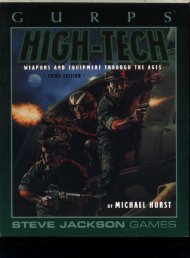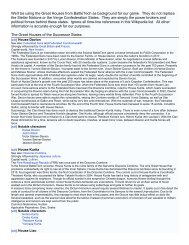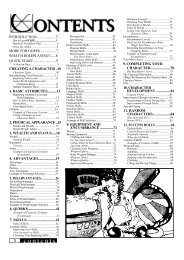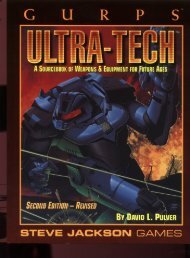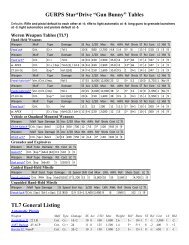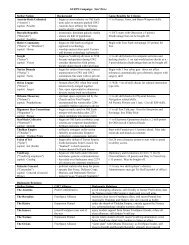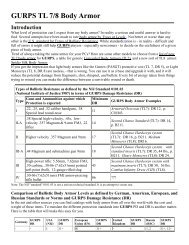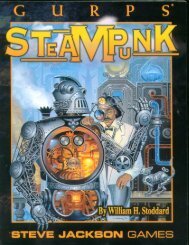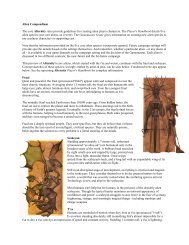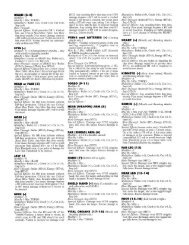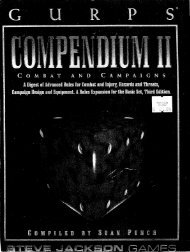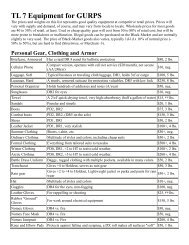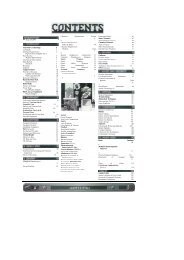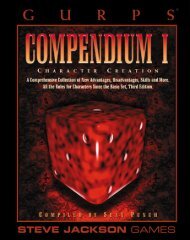Create successful ePaper yourself
Turn your PDF publications into a flip-book with our unique Google optimized e-Paper software.
Wand and Staff<br />
Wands and staffs are magic items, made by<br />
the Staff spell (p. 47/B161). Many wands are<br />
enchanted so that only their owner may use<br />
them; some contain other powerful spells as<br />
well. Only once-living materials (wood, bone,<br />
ivory, etc.) can be used to make a wand.<br />
Touching an item with a wand is as good as<br />
touching it with a finger, for casting purposes.<br />
Likewise, a “jet” spell can be fired from a wand<br />
or staff instead of a finger. Thus, the basic use<br />
of a wand or staff is to increase the mage’s<br />
“touching” reach. Pointing with the staff also<br />
reduces range to the target by 1 hex. A wand or<br />
staff can’t extend range on a missile spell<br />
unless it is specifically enchanted to contain<br />
that spell.<br />
he must be told if it has been penetrated; a wizard can sense the weakening of his<br />
spell if he thinks about it!<br />
Resistance by or against Area Spells: If an old area spell can resist the spell<br />
being cast, or a new area spell can be resisted by people or things in the area, roll<br />
normally to see if the new spell is cast. If it is, each subject in the area rolls<br />
separately to see whether he (or it) succumbs to the new spell.<br />
Example: A Divination spell is cast with an adjusted skill of 17. The target is<br />
in an area protected by a Scrywall (an area spell) which was cast with a skill of<br />
20. The caster rolls an 8 (succeeding by 9). The GM rolls for the Scrywall,<br />
getting a 14 (succeeding by 6). The Divination did better than the Scrywall, so<br />
the caster can “see” his subject. The Scrywall is now weakened by 1, and thus<br />
has an effective skill of 19 if it has to resist another spell.<br />
Another example: Joshua throws Mass Sleep on a section of tunnel<br />
containing six Ores. Mass Sleep is resisted by Health. Joshua’s effective skill is<br />
15. He rolls a 12, succeeding by 3.<br />
Orc 1 has HT 9. He rolls a 10. He fails automatically and sleeps.<br />
Orc 2 has HT 9. He rolls a 7. He succeeded, but only by 2. He sleeps.<br />
Orc 3 has HT 9. He rolls a 6. He succeeded by 3 - a tie. He resists.<br />
Orc 4 has HT 9 and <strong>Magic</strong> Resistance 3 - an effective 15, because MR counts<br />
double to resist an area spell. He rolls an 11, succeeding by 4. He resists.<br />
Orc 5 has HT 9 and 3 points of Strong Will - an effective 12. But he rolls a<br />
13, and fails. He sleeps.<br />
Orc 6 rolls an 18 - a critical failure! The GM rules that Orc 6 falls into a<br />
coma.<br />
Enchantment Spells<br />
These are the spells of the College of Enchantments. They are used to make<br />
or unmake magical items. See Chapter 2 and p. 42 for more details.<br />
Special Spells<br />
These are spells that don’t fit into any of the other categories; follow the<br />
rules given in the spell description.<br />
Ceremonial and Group <strong>Magic</strong><br />
Ordinary magic is cast by a single wizard, and is relatively quick.<br />
Ceremonial magic is much slower (since it involves complex ritual), but it allows<br />
other mages to help the caster. Thus, more powerful spells can be cast, and they<br />
can be maintained longer. Spells like Resurrection are almost never cast except<br />
by ceremonial methods. Blocking spells cannot be cast by a ceremony.<br />
Time required: When ceremonial magic is used, casting time is ten times as<br />
long as shown on the Spell List.<br />
Energy cost: Same as normal. All the energy required is spent at the end of<br />
the casting, when the caster rolls to see if the spell succeeded. Whether it<br />
succeeds or fails, all the energy is spent at this time.<br />
There are two ways to cooperate in ceremonial magic:<br />
Circle. Any number of mages can “link” to cast a spell, if they all know it at<br />
level 15 or better. They must he physically joined in some way - e.g., holding<br />
hands, touching a common center, etc. Any one of them can act as the caster and<br />
make all die-rolls.<br />
The energy cost may be shared among the linked mages in any way they<br />
agree on. If there is a backfire, the GM may either assess one huge result, or roll<br />
separately for each person in the Circle. A backfire involving a dozen mages can<br />
be a chaotic event indeed!<br />
PRINCIPLES OF MAGIC<br />
- 14 -



